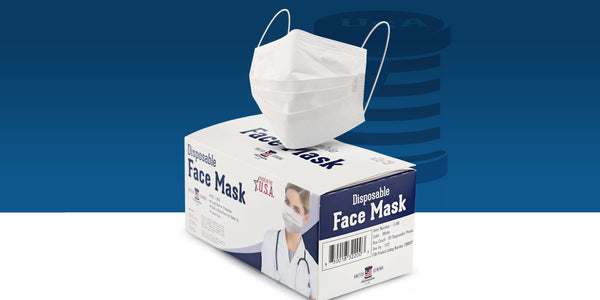Protect Against Transmission with a Surgical Mask
Not all masks are created equal! In this ever changing world of guidelines and mandates, the effectiveness of surgical and medical-grade face masks against the transmission of COVID-19 has stood apart from trends that come and go.
CDC Guidelines
Center for Disease Control guidelines updated in July strongly suggest wearing a face-covering whenever you’re in public, to guard against coronavirus transmission - especially when social distancing isn’t always feasible. Along with masks and social distancing, the CDC recommends frequent hand washing and use of hand sanitizer to help prevent transmission, too.
Single-use surgical masks can block large particles and respiratory droplets released into the air through a cough or sneeze from going into or out of your mouth and nose. Most, like those you can find from United Sewing Automation, are 3-ply. This creates an intricate and nearly impossible passageway through the entire mask. Most cloth or homemade masks are single- or at most double-ply, giving less resistance to particles moving in or out.
A surgical mask can protect you from illness in close contact with someone who is sick. It can also keep the wearer from spreading the virus. That’s why they’re commonly used in dental and medical settings. A University of Edinburgh study showed that wearing any mask reduces the distance an outward breath can travel by 90%. It’s tighter fit around the face gives particles less opportunity to compromise the covering as they might with bandanas or other cloth masks.
And a recent study revealed that surgical and medical-grade masks are just as effective as respiratory masks, such as N95, FFP2, and FFP3, for keeping the risk of transmission down.
The Centre for Evidence-Based Medicine at the University of Oxford conducted the research in March 2020. Researchers considered standard surgical masks for healthcare workers in the prevention of viral respiratory illnesses. Although no mask can guarantee it will stop all infection, using surgical masks, along with other PPE standards, is effective during aerosol-generating procedures. CEBM studies are ongoing.
Studies are Ongoing
It’s important to note that most real-world studies to compare masks’ effectiveness were conducted for influenza and similar benign respiratory conditions in hospitals. Coronavirus is a severe acute respiratory infection, with no similar studies to date. Expert analysis has been applied to masks’ effectiveness in influenza, MERS, and SARS epidemics.
The study concluded that respirator masks did not add value over standard medical masks when used with other PPE measures.
In 2008, the U.S. National Library of Medicine and National Institutes of Health published a study on surgical mask effectiveness against respiratory infections. Their data revealed surgical masks to be twice as effective as homemade masks to prevent transmission. It also showed the surgical mask became slightly more effective when the subject engaged in low-level strenuous activities, such as walking. A final phase of the study saw surgical masks as effective as an FFP2 mask in containing particles expelled inside the mask.
Sources:
Centre for Evidence-Based Medicine
U.S. National Library of Medicine
The information contained in this article is for educational and informational purposes only and is not intended as health or medical advice. Always consult a physician or other qualified health provider regarding any questions you may have about a medical condition or health objectives.

